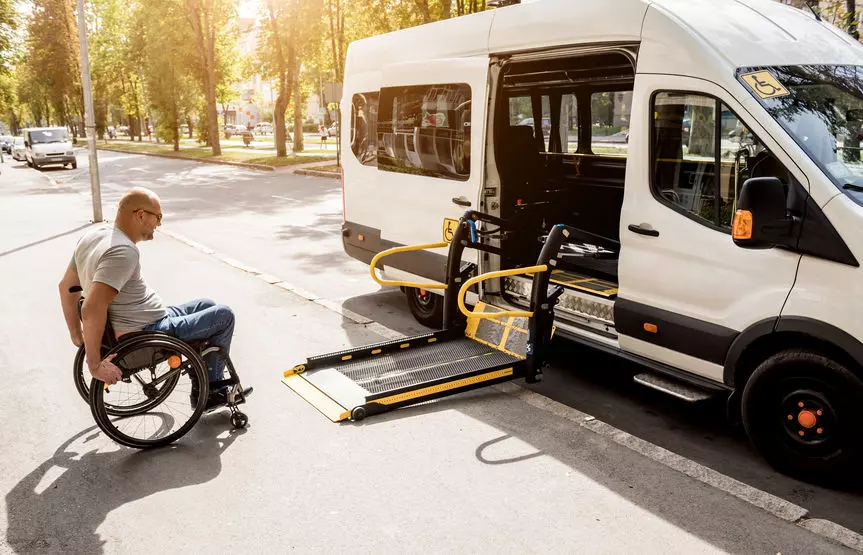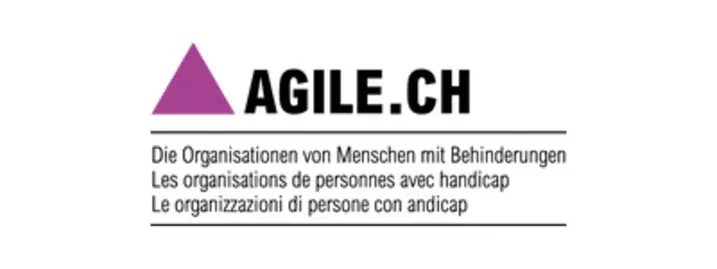Equal Mobility Through Paratransit Services?
While transport services that supplement public transport are vital for people with disabilities, they can be expensive for those affected, and their availability is often limited. This project is based on the experiences of persons with disabilities. It aims to create a foundation for improving paratransit services.
Situation
Many people in Switzerland cannot use public transport or can only use it to a limited extent (e.g., due to a motor or visual impairment). They rely on paratransit services to participate in daily life. Various insurance providers, such as health insurance funds and the Swiss Disability Insurance and Old Age and Survivors' Insurance, provide some financial support by subsidizing travel. There are also foundations in some Swiss cantons that co-finance transport services. However, the responsibilities of these sponsors are often unclear. In addition, benefits may be tied to specific purposes and limited, for example, to a certain number of journeys per month.
Little is known about how people experience mobility limitations and how they affect their ability to work and engage in social activities. However, their views are relevant as Switzerland is obliged under the UN Convention on the Rights of Persons with Disabilities and the Swiss Disability Discrimination Act to facilitate the personal mobility of persons with disabilities.
- Projektflyer(PDF 374,8 KB) (in german)
- Projektflyer in leichter Sprache(PDF 332,8 KB) (in german)
Objective
The objectives of this research project were
- To provide an overview of national and cantonal regulations for paratransit services.
- To describe the limitations and disadvantages experienced by people with disabilities in this area.
- To develop recommendations for action for policy makers and those responsible in the relevant organizations.
Method and approach
The project team collected the views of persons with disabilities from different perspectives and using several methods:
- First, the experiences of 31 persons with disabilities were collected in five group discussions and analysed following the qualitative content analysis method.
- The findings of the qualitative study served as the basis for a large-scale quantitative survey in German-, French- and Italian-speaking Switzerland, in which 536 people participated.
- At the same time, the research team compiled an overview of the legal basis for paratransit services in Switzerland.
- Based on this overview and the results of the qualitative and quantitative data collection and the legal basis, the researchers developed recommendations for action and involved relevant stakeholders.
Results
In total, 594 individuals, both with and without disabilities, participated in the studies of the project. Among them, 336 (57%) were women, 256 (43%) were men, and two identified as another gender. The participants ranged in age from 18 to 103 years (mean=62.4, SD=19.6).
The results show that paratransit services are used for various purposes: for therapy and medical appointments, leisure activities, shopping, or commuting to work. These services are primarily used for short distances. Participants highly appreciate the personal care provided by the drivers, reliability, and safety of these services. The use of these services varies from person to person. While some can turn to alternative transportation services, paratransit services are the only option for others. As a result, high prices, unclear financing responsibilities, limited availability, and insufficient inter-cantonal coordination can be particularly limiting for these individuals. Overall, the legal framework for paratransit services is unclear, and the division of responsibility between the federal government and the cantons is not well-defined.
In summary, people with disability value paratransit services as crucial support for their daily activities and social participation. However, the basic rights of people with disabilities are affected, and the goals of the Convention on the Rights of Persons with Disabilities in the area of mobility are not being met. As a result, the following recommendations are proposed:
- Expanding the scope of the Federal Act on the Elimination of Discrimination against People with Disabilities (DDA) to cover paratransit services.
- Integrating paratransit services into public transport by subjecting them to the Passenger Transport Act.
- Ensuring nationwide coordination of paratransit services in terms of offerings, usage, booking, and payment.
You can find the complete results in the finale report (in german).
Publications and Reports
- Die vergessene Kundschaft article zhaw-Impact 01-2022 (in German)
ZHAW Publikationsdatenbank
-
Egger, Selina Marita; Gantschnig, Brigitte; Filippo, Martina; Liechti, Ronald; Gemperli, Armin,
2024.
Journal of Transport & Health.
38(101856).
Available from: https://doi.org/10.1016/j.jth.2024.101856
-
Egger, Selina; Filippo, Martina; Liechti, Ronald; Gemperli, Armin; Gantschnig, Brigitte,
2024.
Handlungsoptionen für eine inklusive Mobilität [poster].
In:
6. Kongress der Ergotherapie, Fribourg, Schweiz, 24.-25. Mai 2024.
Winterthur:
ZHAW Zürcher Hochschule für Angewandte Wissenschaften.
Available from: https://doi.org/10.21256/zhaw-30946
-
Egger, Selina Marita; Filippo, Martina; Liechti, Ronald; Gemperli, Armin; Gantschnig, Brigitte,
2024.
Inklusion durch gleichberechtigte Mobilität für Menschen mit Behinderungen.
In:
6. Kongress der Ergotherapie, Fribourg, Schweiz, 24.-25. Mai 2024.
-
Gantschnig, Brigitte E.; Egger, Selina M.; Filippo, Martina; Liechti, Ronald; Gemperli, Armin,
2023.
Winterthur:
ZHAW Zürcher Hochschule für Angewandte Wissenschaften.
Available from: https://doi.org/10.21256/zhaw-2490
-
Egger, Selina Marita; Filippo, Martina; Liechti, Ronald; Gemperli, Armin; Gantschnig, Brigitte,
2023.
Gleichberechtigte Mobilität dank ÖV-ergänzender Fahrdienste?.
In:
Fachtagung für Dienstleistungsverantwortliche des Rotkreuz-Fahrdienstes aus den Kantonalverbänden, Olten, Schweiz, 25. Mai 2023.
-
Filippo, Martina; Egger, Selina Marita; Liechti, Ronald; Gemperli, Armin; Gantschnig, Brigitte,
2023.
Through transportation to participation : experiences in using paratransit services.
In:
16th Nordic Network on Disability Research Conference (NNDR), Reykjavik, Iceland, 10 - 12 May 2023.
-
Egger, Selina Marita; Gantschnig, Brigitte Elisabeth; Filippo, Martina,
2022.
Die Rechte von Menschen mit Behinderungen berücksichtigen.
Ergotherapie.
2022(8).
-
Egger, Selina Marita; Gemperli, Armin; Filippo, Martina; Liechti, Ronald; Gantschnig, Brigitte Elisabeth; et al.,
2022.
The experiences and needs of persons with disabilities in using paratransit services.
Disability and Health Journal.
15(4), pp. 101365.
Available from: https://doi.org/10.1016/j.dhjo.2022.101365
Project Organisation
- Project lead
Prof. Dr. phil. Brigitte Gantschnig - Project period
February 2021 - June 2023 - Project team
Prof. Dr. phil. Brigitte Gantschnig, Head of ZHAW Occupational Therapy Research Centre
Dr. Ronald Liechti, Director, BTB (Canton of Bern Disability Transport Service) Foundation
Dr. Martina Filippo, Research Associate, Center for Social Law, ZHAW School of Management and Law
Selina Egger, MSc, occupational therapist, doctoral candidate at the ZHAW Occupational Therapy Research Centre
Thomas Ballmer, MSc, occupational therapist, research associate at the ZHAW Occupational Therapy Research Centre
Prof. Dr. Armin Gemperli, University of Lucerne, professor of health sciences - Project partners
Behindertentransporte Kanton Bern (BTB Canton of Bern Disability Transport Service)
ZHAW School of Management and Law
AGILE.CH
Pro Infirmis
University of Lucerne - Funding
Federal Bureau of the Equality of People with Disabilities
Behindertentransporte Kanton Bern (BTB Canton of Bern Disability Transport Service)
Pro Infirmis - Project status
Implementation






